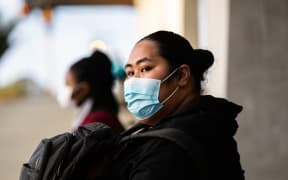By Chris Ford*

It is no longer mandatory to wear face masks in health and aged care facilities after the government announced all remaining Covid-19 restrictions were being dropped from 15 August 2023. Photo: 123RF
It is no longer mandatory to wear face masks in health and aged care facilities after the government announced all remaining Covid-19 restrictions were being dropped from 15 August 2023.
Opinion - Disabled people have once again been overlooked as the last of the Covid-19 rules regarding mask wearing in health and rest home settings and seven-day mandatory isolation for Covid sufferers were ended by the government last week.
Obviously, like anyone, I and many other members of the disabled community are supportive of removing restrictions but many within our community believe that now is not the right time.
This is the case as winter has not fully passed yet. August to September is still a peak period for winter ailments and that now includes Covid-19.
The last remaining restrictions were left in place to ensure that our health system did not totally collapse as Aotearoa went through the colder months. It appears that the restrictions have largely aided the health system from not becoming completely overrun over the last two years, even though sections of it have been from time-to-time.
Ensuring that people stay at home if they contract Covid-19 has probably saved hundreds of lives and thousands of hospitalisations, including of disabled people. Evidence published this year showed that while New Zealand has had a lower rate of deaths and hospitalisations due to Covid than other comparable countries, disabled people who were infected with the virus were still twice as likely to die from it compared to non-disabled people in this country.
That terrible statistic in itself should mean that government could have overlooked any electoral or health considerations by deciding at the beginning of the year (when they initially signalled that they would review the last restrictions) that they would automatically come off at a certain date unless adverse circumstances intervened.
In my view, that certain date should have been on or around 1 November when the weather is warmer and as winter virus infections begin to decline in number. In that way, government would have left itself less vulnerable to suggestions that it was lifting them due to electoral considerations and it would have also aligned with medical evidence that warmer months are usually the enemy of serious viruses like Covid.
Nevertheless, while I recognise that Covid can strike at any time of the year as it is a non-seasonal illness, there will still be peaks especially in the colder months from now on. And that's why we need to be continually vigilant, especially around disabled people and people with health conditions going forward.
That's why I believe in the recommendations of some health academics for ongoing government-funded publicity campaigns to be run around Covid-19 and its attendant risks. Alongside continuing promotional campaigns like the very effective Te Whatu Ora 'Stay Home, Get Well' advertising campaign, a code of practice should be developed and adopted by anyone be they disability/aged support providers, businesses, schools, tertiary institutions, government agencies, non-government organisations and Māori organisations, which states that they adhere to Covid-19 and health prevention best practises as part of their organisational policies.
This code of practice (that should be incorporated into organisational health and safety policies) would include respect and support for those who choose to wear masks and other protective measures, support for employees and clients to take more paid sick time off especially if they develop Covid, as well as enabling employees, students and volunteers to work and/or study from home if they have a disability or health condition(s) which leaves them at higher risk of contracting Covid-19 or becoming seriously ill from it.
Adopting codes of practice would also make provision for organisations to be supplied by government on an ongoing basis with face masks and other protective equipment, as well as resources providing information about Covid-19 and other viruses to management, staff and clients.
Groups at high risk of contracting Covid including Māori, Pasifika, ethnic communities, disabled and older people should continue to be targeted by government-funded culturally-specific, accessibly communicated campaigns. For disabled and D/deaf people, this would mean the continuing availability of accessible information about Covid in alternative formats including Braille, Easy Read, Large Print, New Zealand Sign Language and visual formats.
Disabled people would like to see the retention of the disability assistance aspect of Healthline which has assisted so many disabled New Zealanders with information and support throughout the pandemic.
Above all, Covid-19 anti-virals should be automatically made available, free-of-charge by government to disabled people who test positive for the disease. This is one way of ensuring that the comparatively higher death toll amongst disabled people is dramatically lowered. It would also ensure equity with other groups who are currently automatically entitled to them including older people.
Regular, free vaccination campaigns particularly focused on Covid-19 should continue as these have aided our national success in managing the virus and in keeping disabled people and other at-risk groups from experiencing an even higher risk of death and long-term impacts, including Long Covid.
Speaking of Long Covid, government should fully recognise this condition as creating disability for those who acquire it in terms of, for example, enabling people with it to access government disability support services including home help, personal assistance and housing/equipment modifications. I am not going to traverse the issues of the inequities around disability support provision for ACC and Whaikaha - Ministry of Disabled People clients here, suffice to say that Long Covid has brought the issues around existing inequities into sharp relief again, meaning that they must be resolved once and for all.
Underpinning these measures should be a National Covid-19 and Serious Illness Management and Prevention Strategy from government. I believe there should be a multiparty approach to this in that whomever wins the 14 October election should pledge themselves to develop such a strategy with adequate resourcing and funding sitting behind it. I believe that the Ministry of Health, Te Whatu Ora and Te Aka Whai Ora (Māori Health Authority) should lead this work alongside community stakeholders including disabled people and tāngata whaikaha Māori.
Developing a Covid-19 and Serious Illness Management and Prevention Strategy would mean that we could keep Covid and other respiratory illnesses like seasonal influenza under greater control meaning that at-risk communities, like disabled and older people, would feel better protected irrespective of whichever government is in power.
All of these things should be what government needs to do and what all political parties should be thinking about as we head into an era where Covid-19 is now a permanent part of the health landscape.
* Chris Ford is a Dunedin-based researcher and disability advocate. He works as Regional Policy Advisor for Disabled Persons Assembly (DPA) New Zealand. However, the views expressed here are his own but do reflect the sentiments of both himself and countless others in the disabled community.





